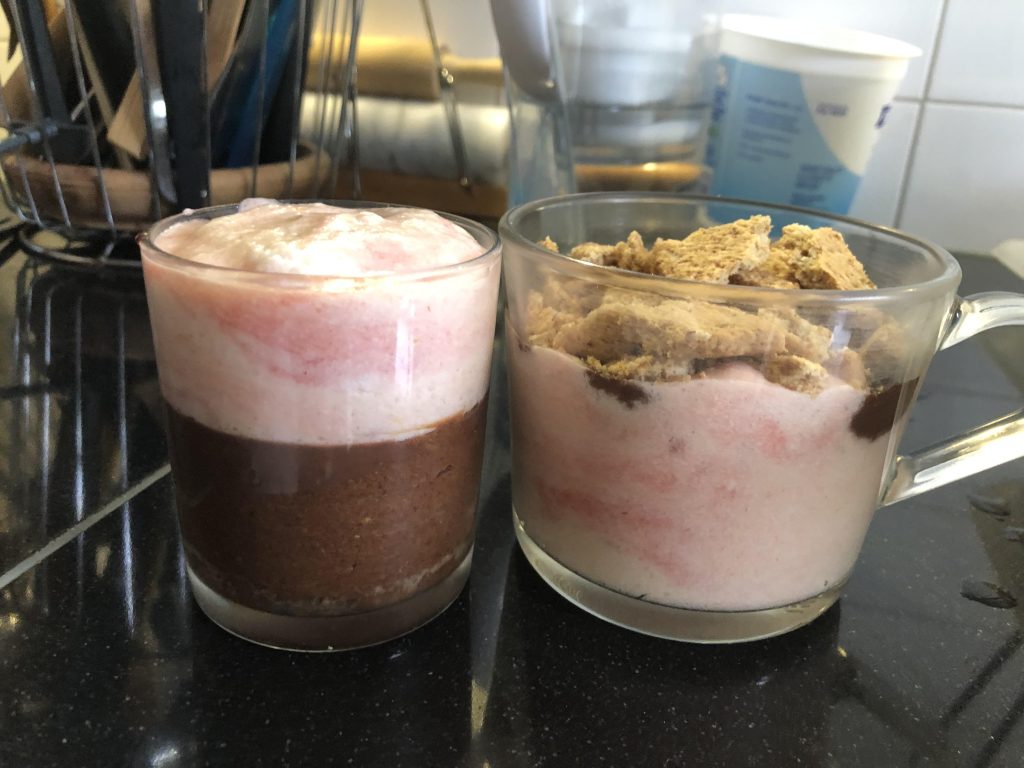Recently, I was looking for a recipe to make a mousse for my brother’s birthday. For a few months we’ve been exchanging an idea of a layered mousse with two flavours, chocolate and strawberry, and a biscuit base. While I had a chocolate mousse recipe already down (I had been influenced into choosing Julia Child’s recipe), I found myself struggling to find a strawberry mousse recipe. Well, not exactly. I found many easy strawberry mousse ingredients, but none that were truly a traditional mousse.
A traditional mousse, as defined by the encyclopaedia britannica, usually consists of a whipped mixture with pureed flavouring mixed in. In essence, there is a light and fluffy medium which suspends the flavouring. Typically the medium is egg whites or whipped cream, and the puree is mixed into a custard before being folded into the mousse.
Most of the recipes I found were more akin to a chantilly instead of a mousse. They were usually sugar and strawberry puree mixed into whipped cream. One unfortunate thing about my brother is that he is lactose intolerant, so I couldn’t use these recipes even if I wanted to. Unfortunately, I could only find simple or easy strawberry mousse recipes, even when I added ‘egg whites’ into the required section. Eventually, I reworked Julia Child’s recipe to a strawberry mousse with gelatin to help it set.

Picture of the mousse. Largely because I’m proud of it.
This got me thinking about how ‘easy’ and ‘simple’ recipes dominate the sphere of influence. I searched up ‘chocolate pudding’ and ‘easy chocolate pudding’ is in the top five. Similar instances occur for roast lamb, brownies, and even the notoriously difficult croissant. This even strays into crafting aspects, like sewing or embroidery. While it’s not necessarily bad that easier versions of recipes or tutorials exist, the fact that it drowns out more ‘traditional’ methods is sometimes a shame. Furthermore, on some occasions it can feel a bit like false advertisement. That 2-ingredient, easy chocolate mousse recipe made of only water and chocolate isn’t really a chocolate mousse, neither is that melted chocolate ganache set with tapioca.
It seems that with the advent of the ‘world brain’ it seems like there has been an oversaturation of these simple recipes clogging the top of search results. The ability for anyone to share their recipes online is both a blessing and a curse. Family recipes, perfected over time are shared online everyday, but for each pain-stakingly crafted recipe is another which takes a difficult recipe, alters it almost entirely, and then calls it by the same name.
Comparatively, in the past when cookbooks and magazines were the main way to spread recipes, the bar for the recipes shared was much higher. Cookbooks would group different types of recipes into comprehensive categories. ‘Easy’ and ‘simple’ recipes would be grouped with other ones, allowing for easy navigation. The oversaturation of all sorts of recipes without categorisation, enhanced by the exponentially growing internet the world brain creates, leads to a mass of unsorted recipes listed more by popularity than anything else.
All in all, it seems that the world brain has resulted in many byproducts which are at best annoying. In this case, the oversaturation of media superimposed with the sorting system of searching has resulted in less ‘authentic’ or ‘traditional’ recipes. While not an entirely bad thing, the lack of categorisation of these recipes makes it annoying to find any of the harder or original recipes. It is a lack of organisation that has resulted from the information boom which has led to phenomena like this.



I actually really like that these simple recipes are so popular! I think it is still easy to find a traditional or more advanced recipe online, but for most people that is just not what they´re looking for. I feel like almost no one has enough time to cook complicated dishes these days, including myself. Also, simple recipes are usually cheap, which is a really big advantage for me.
Very nice read, and thanks for adding the photo!
I am surprised you had such a hard time finding the right recipe, since I (naively?) expected that filters do their job, seeing through the first thick layer of most popular recipes. But apparently, the mess created by the ever-increasing amount of recipes is too big, or the development of filters and sorting algorithms lags behind.
Anyway, I think your blog shows that the extremes are overemphasized by/in the World Brain, whether it be super easy recipes with a small amount of ingredients resulting in a visually appealing edible product, or almost unachievable creations like hyperrealistic cakes.
I must admit I am happy with the fact that the in my view somewhat prescriptive world of cookbooks got a more unconventional counterpart online. That doesn’t necessarily lead to the total disappearance of traditional recipes. In fact, I see that this gap is filled by, e.g., Italian nonnas, (allegedly) preparing truly authentic traditional dishes before an audience of millions.